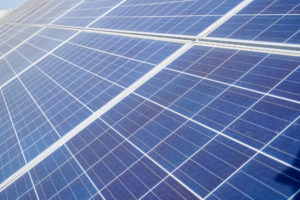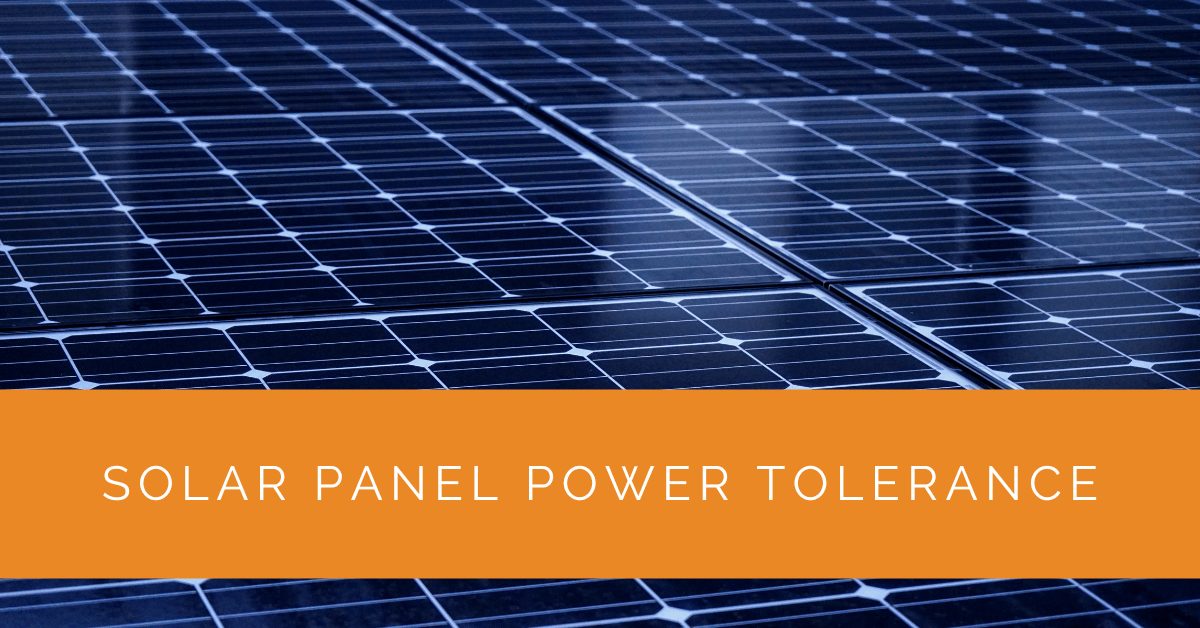Solar panels have become a popular and reliable renewable energy source that provides a clean and sustainable power source. As more individuals and businesses embrace solar energy solutions, it is essential to understand the various aspects of solar panel technology. In this article, we will explore the concept of solar panel power tolerance in-depth and its critical role in the efficiency and performance of solar panels.
Contents
- 1 Key Takeaways
- 2 Solar Panel Basics
- 3 Solar Panel Specification Overview
- 4 Power Tolerance in Solar Panels
- 5 Real-World Application
- 6 Case Study: Optimizing Solar Panel Performance Through Power Tolerance Selection
- 7 Expert Insights From Our Solar Panel Installers About Understanding Solar Panel Power Tolerance
- 8 Experience Solar Excellence with Us!
- 9 Conclusion
Key Takeaways
- Solar panel power tolerance, represented as a range, impacts a panel’s actual power output, making it crucial for performance reliability.
- Understanding solar panel specifications, including power tolerance and module efficiency, is essential when evaluating panels for your solar energy project.
- Selecting the right power tolerance for your specific needs, optimizing system design, and partnering with reputable manufacturers and installers can help you harness the full potential of solar panels for clean and sustainable energy generation.
Solar Panel Basics
Before we dive into the intricacies of power tolerance, let’s establish a solid foundation by exploring the basics of solar panels. Solar panels are the heart of any solar energy system, converting sunlight into electricity. They are composed of interconnected solar cells, collectively called solar modules or panels. These cells work together to harness the sun’s energy and transform it into usable power.
Components of a Solar Panel
- Solar Cells: Solar cells are the fundamental building blocks of a solar panel. They contain semiconductors like silicon, which absorb photons from sunlight and release electrons, creating an electric current.
- Solar Modules: Multiple solar cells are interconnected within a solar module, the basic unit of a solar panel. Modules are designed to capture and optimize sunlight, improving the overall efficiency of the panel.
Solar Cell Efficiency and Its Relation to Power Tolerance
The efficiency of a solar cell is a crucial factor in determining the overall performance of a solar panel. Solar cell efficiency refers to the percentage of sunlight converted into electricity. High-efficiency cells are more effective at harnessing solar energy, resulting in greater power output.

Solar Panel Specification Overview
Understanding solar panel specifications is essential when evaluating the suitability of panels for your solar energy project. Solar panel manufacturers provide detailed information about their products, including power tolerance.
Deciphering Power Tolerance in Solar Panel Data Sheets
Power tolerance is a critical specification found in the data sheets provided by solar panel manufacturers. It is typically represented as a range, such as “+/- 5%.” This range indicates the allowable deviation from the rated power output of the panel. For instance, if a solar panel is rated at 300 watts with a power tolerance of +/- 5%, the actual power output can vary between 285 watts and 315 watts.
Interpreting Module Efficiency Ratings
In addition to power tolerance, module efficiency ratings are essential when assessing solar panels. Module efficiency measures how effectively the panel converts sunlight into electricity. Higher efficiency panels generate more power per square foot, making them ideal for situations with limited space.
Power Tolerance in Solar Panels
Now that we have a solid understanding of solar panel basics and specifications let’s explore power tolerance in greater detail.
Defining Power Tolerance in Solar Panels
Power tolerance is an indicator of a solar panel’s performance reliability. It accounts for variations in manufacturing processes and environmental factors that can affect a panel’s output. Panels with a positive power tolerance are guaranteed to perform at or above their rated power output, while those with a negative power tolerance may underperform.
How Manufacturers Determine Power Tolerance
Solar panel manufacturers use rigorous testing methods to determine power tolerance. These tests are conducted under standard test conditions (STC), which simulate ideal sunlight and temperature conditions. By subjecting panels to these conditions, manufacturers can accurately assess their power output and calculate the power tolerance range.
Impact of Power Tolerance on Solar Panel Performance
The power tolerance of a solar panel has a direct impact on its real-world performance. Panels with a narrower tolerance range are more predictable and offer consistent power output. This reliability is crucial for applications where consistent power generation is essential, such as grid-tied systems and commercial installations.

Real-World Application
To illustrate the practical implications of power tolerance, let’s explore some real-world scenarios.
Case Studies: Power Tolerance in Different Solar Panel Brands
Examining case studies involving various solar panel brands can provide valuable insights. Different manufacturers may offer panels with varying power tolerances, affecting solar energy systems’ overall performance and reliability.
How to Choose the Right Power Tolerance for Your Solar Panel Installation
Selecting the appropriate power tolerance for your solar panel installation is critical. Location, climate, and budget all play a role in determining the ideal power tolerance range for your specific needs.
Maximizing the Benefits of Power Tolerance
Understanding power tolerance empowers you to maximize the benefits of solar energy. By selecting panels with the right power tolerance and coupling them with efficient inverters and a well-designed system, you can optimize your solar power output and harness the full potential of solar panels.
Case Study: Optimizing Solar Panel Performance Through Power Tolerance Selection
Background
A residential client approached us to design and install a solar energy system that maximized efficiency and reliability. The client was particularly interested in understanding how power tolerance could impact their system’s performance and overall energy output.
Project Overview
Our goal was to create a solar PV system that not only met the client’s energy needs but also provided consistent and reliable performance. We focused on selecting panels with an optimal power tolerance range to ensure maximum efficiency.
Implementation
- Material Selection: We chose high-efficiency monocrystalline solar panels with a power tolerance of +/- 3%. This narrow tolerance range guaranteed that the panels would perform at or above their rated power output, ensuring reliability.
- System Design: Our design included a detailed analysis of the client’s energy consumption patterns and available roof space. We optimized the panel layout to minimize shading and maximize sunlight exposure.
- Inverter Integration: To complement the high-efficiency panels, we integrated a top-tier inverter with advanced Maximum Power Point Tracking (MPPT) technology. This ensured that the system operated at its highest efficiency by continuously optimizing the power output from each panel.
- Installation Techniques: We employed meticulous installation techniques to ensure that all connections were secure and that the panels were positioned at the optimal angle for maximum solar gain. Proper cabling and wiring practices minimized any potential energy losses.
Results
- Enhanced Energy Output: The high-efficiency panels with a narrow power tolerance range delivered a consistent and reliable energy output. The client reported a 15% increase in energy generation compared to their previous system, which had a broader power tolerance range.
- Cost Savings: The initial investment in high-quality panels and efficient inverters was offset by the increased energy production and reduced energy bills. The client achieved a return on investment within three years.
- Sustainability Impact: The optimized system contributed significantly to reducing the client’s carbon footprint. The reliable energy output from the system ensured a steady supply of clean energy, supporting the client’s commitment to sustainability.
- System Reliability: The combination of high-efficiency panels, advanced inverters, and professional installation resulted in a highly reliable solar energy system. The client experienced minimal downtime and consistent performance, even during periods of lower sunlight.
Summary
This case study highlights the importance of understanding and selecting the right power tolerance for optimizing solar panel performance. By choosing high-efficiency panels with a narrow power tolerance range, integrating advanced inverters, and employing meticulous installation techniques, we were able to maximize the energy output and reliability of the client’s solar PV system. The result was a highly efficient, cost-effective, and sustainable energy solution that met the client’s needs and supported their commitment to green energy.
Expert Insights From Our Solar Panel Installers About Understanding Solar Panel Power Tolerance
Power tolerance is crucial for ensuring reliable energy output from your solar panels. It helps in understanding the range within which your panels will operate, ensuring you get the most out of your investment.
Lead Solar Engineer
Choosing panels with a narrower power tolerance range can significantly enhance the predictability of your system’s performance, which is vital for grid-tied and commercial installations.
Senior Solar Technician
Understanding and selecting the right power tolerance for your solar project allows you to optimize energy generation and ensure long-term efficiency and reliability.
Solar Energy Consultant
Experience Solar Excellence with Us!
Trust in Solar Panels Network USA, where our seasoned experts deliver top-quality solar solutions for homes and businesses nationwide. With a legacy of countless successful installations and a commitment to sustainable energy, we’re your reliable partner in the solar journey. Ready for a brighter, eco-friendly future? Call us now at (855) 427-0058 and harness the power of the sun!
Conclusion
Our expertise in solar energy underscores the importance of comprehending solar panel power tolerance. By deciphering specifications, exploring real-world applications, and making informed choices regarding power tolerance, you can ensure that your solar energy system performs optimally, harnessing the boundless energy of the sun to provide clean and sustainable power for your home or business.
As you embark on your solar energy journey, remember that power tolerance is just one aspect of a broader picture. Partnering with experienced professionals in solar panel installation will further enhance the efficiency and longevity of your solar energy system. Make the most of solar power and contribute to a greener, more sustainable future.
About the Author
Solar Panels Network USA stands at the forefront of solar energy solutions, driven by a team of seasoned solar engineers and energy consultants. With over decades of experience in delivering high-quality solar installations and maintenance, we are committed to promoting sustainable energy through customer-centric, tailored solutions. Our articles reflect this commitment, crafted collaboratively by experts to provide accurate, up-to-date insights into solar technology, ensuring our readers are well-informed and empowered in their solar energy decisions.

